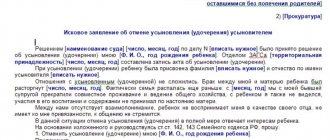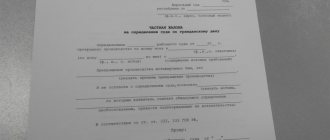Procedure for initiating a case. Acceptance of the claim
The initiation of a case represents the initial (first) stage in the development of proceedings in the court of first instance. To initiate a civil case in court, it is necessary to comply with a certain legal procedure, which covers the actions of both the plaintiff and the individual judge. At the same time, the rules for initiating a case are practically the same in all types of civil proceedings, differing in the most insignificant way. The process of initiating a case according to the Code of Civil Procedure of the Russian Federation is as follows:
1) when filing an application, the plaintiff must be legally competent according to the rules provided for the recognition of civil procedural capacity for individuals and organizations (Article 37);
2) the statement of claim must be filed in court with proper jurisdiction (Articles 23-32);
3) statement of claim in accordance with Art. 131 is submitted in writing and indicating the following required data:
- name of the court to which the application is filed;
- the name of the plaintiff, his place of residence or, if the plaintiff is an organization, its location, as well as the name of the representative and his address, if the application is submitted by a representative;
- the name of the defendant, his place of residence or, if the defendant is an organization, its location;
- what is the violation or threat of violation of the rights, freedoms or legitimate interests of the plaintiff and his demands;
- the circumstances on which the plaintiff bases his claims and evidence supporting these circumstances;
- the price of the claim, if it is subject to assessment, as well as the calculation of the collected or disputed amounts of money;
- information about compliance with the pre-trial procedure for contacting the defendant, if this is established by federal law or provided for by the agreement of the parties;
- list of documents attached to the application.
The application may indicate telephone numbers, fax numbers, email addresses of the plaintiff, his representative, the defendant, other information relevant to the consideration and resolution of the case, as well as the plaintiff’s requests.
The statement of claim is signed by the plaintiff or his representative if he has the authority to sign the statement and present it to the court;
4) in accordance with Art. 132 of the Code of Civil Procedure of the Russian Federation the following are attached to the statement of claim:
- its copies according to the number of defendants and third parties;
- documents confirming payment of the state duty. If the plaintiff is not exempt from paying the state duty, but due to his difficult property situation cannot pay it, then he must attach to the statement of claim a petition for a deferment, installment payment of the state duty, a reduction in its size, or - for citizens - for exemption from it payment accompanied by evidence of your difficult financial situation;
- a power of attorney or other document certifying the authority of the plaintiff’s representative, if the application is submitted by a representative;
- documents confirming the circumstances on which the plaintiff bases his claims, copies of these documents for defendants and third parties, if they do not have copies;
- evidence confirming the implementation of the mandatory pre-trial dispute resolution procedure, if such a procedure is provided for by federal law or agreement;
- - calculation of the amount of money being recovered or disputed, signed by the plaintiff, his representative, with copies in accordance with the number of defendants and third parties.
The issue of accepting an application in civil cases is decided by the judge alone. According to Art. 133 of the Code of Civil Procedure of the Russian Federation, the judge is obliged to consider the issue of its acceptance within five days from the date of receipt of the statement of claim to the court. The judge checks the presence of the necessary factual composition and has the right to make one of four determinations:
- on the acceptance of a statement of claim for proceedings, initiating proceedings in a specific civil case in the court of first instance;
- about refusal to accept an application;
- about the return of the application;
- about leaving the application without progress.
Subsection II. CLAIM PROCEEDINGS
Chapter 12. BRINGING A CLAIM
Article 131. Form and content of the statement of claim
1. The statement of claim is submitted to the court in writing.
2. The statement of claim must indicate:
1) the name of the court to which the application is submitted;
2) the name of the plaintiff, his place of residence or, if the plaintiff is an organization, its address, as well as the name of the representative and his address if the application is submitted by a representative;
3) information about the defendant: for a citizen - last name, first name, patronymic (if any) and place of residence, as well as date and place of birth, place of work (if known) and one of the identifiers (insurance number of an individual personal account, taxpayer identification number , series and number of an identity document, main state registration number of an individual entrepreneur, series and number of a driver’s license, series and number of a vehicle registration certificate), for an organization - name and address, as well as, if known, taxpayer identification number and main state registration number. In a citizen's statement of claim, one of the identifiers of the defendant citizen is indicated if it is known to the plaintiff;
4) what is the violation or threat of violation of the rights, freedoms or legitimate interests of the plaintiff and his demands;
5) the circumstances on which the plaintiff bases his claims and evidence confirming these circumstances;
6) the price of the claim, if it is subject to assessment, as well as the calculation of the collected or disputed amounts of money;
7) information about compliance with the pre-trial procedure for contacting the defendant, if this is established by federal law;
7.1) information about the actions taken by the party (parties) aimed at reconciliation, if such actions were taken;
 list of documents attached to the application.
list of documents attached to the application.
The application may indicate telephone numbers, fax numbers, email addresses of the plaintiff, his representative, the defendant, other information relevant to the consideration and resolution of the case, as well as the plaintiff’s requests.
3. The statement of claim brought by the prosecutor in defense of the interests of the Russian Federation, constituent entities of the Russian Federation, municipalities or in defense of the rights, freedoms and legitimate interests of an indefinite number of persons must indicate what exactly their interests are, what right is violated, and also there must be a reference to a law or other regulatory legal act that provides ways to protect these interests.
If the prosecutor appeals to protect the legitimate interests of a citizen, the application must contain a justification for the impossibility of bringing a claim by the citizen himself or an indication of the citizen’s appeal to the prosecutor.
4. The statement of claim is signed by the plaintiff or his representative if he has the authority to sign the statement and present it to the court.
A statement of claim submitted by filling out a form posted on the official website of the court on the Internet, containing a request to secure the claim, is signed with an enhanced qualified electronic signature in the manner established by the legislation of the Russian Federation.
Article 132. Documents attached to the statement of claim
The following are attached to the statement of claim:
1) a document confirming the payment of the state duty in the established manner and amount or the right to receive a benefit in the payment of the state duty, or a petition for a deferment, installment plan, a reduction in the amount of the state duty or an exemption from paying the state duty;
2) a power of attorney or other document certifying the authority of the plaintiff’s representative;
3) documents confirming the implementation of the mandatory pre-trial dispute resolution procedure, if such a procedure is established by federal law;
4) documents confirming the circumstances on which the plaintiff bases his claims;
5) calculation of the amount of money being recovered or disputed, signed by the plaintiff, his representative, with copies in accordance with the number of defendants and third parties;
6) notification of delivery or other documents confirming the sending to other persons participating in the case, copies of the statement of claim and documents attached to it, which other persons participating in the case do not have, including in the case of filing a statement of claim and attached documents with the court documents to it by filling out a form posted on the official website of the relevant court on the Internet;
7) documents confirming that the party (parties) have taken actions aimed at reconciliation, if such actions have been taken and the relevant documents are available.
Article 133. Acceptance of a statement of claim
1. The judge, within five days from the date of receipt of the statement of claim by the court, is obliged to consider the issue of its acceptance for court proceedings. The judge issues a ruling on the acceptance of the application for court proceedings, on the basis of which a civil case is initiated in the court of first instance.
2. The ruling on acceptance of the statement of claim shall indicate the preparation of the case for trial, the actions that must be taken by the persons participating in the case, including for reconciliation, the timing of their implementation, as well as telephone and fax numbers of the court, its postal address, address the official website of the court on the Internet information and telecommunications network, the court’s email address, through which persons participating in the case can send and receive information about the case under consideration and other information provided for by this Code.
3. Copies of the ruling on acceptance of the statement of claim for court proceedings are sent to the persons participating in the case no later than the next working day after the day it is issued.
Article 134. Refusal to accept a statement of claim
1. The judge refuses to accept the statement of claim if:
1) the application is subject to consideration in constitutional or criminal proceedings, proceedings in cases of administrative offenses, or is not subject to consideration in the courts; the application was submitted in defense of the rights, freedoms or legitimate interests of another person by a state body, local government body, organization or citizen who is not granted such a right by this Code or other federal laws; in an application submitted on one’s own behalf, acts are contested that do not affect the rights, freedoms or legitimate interests of the applicant;
2) there is a court decision that has entered into legal force on a dispute between the same parties, on the same subject and on the same grounds, or a court ruling to terminate the proceedings in connection with the acceptance of the plaintiff’s refusal of the claim or the approval of a settlement agreement between the parties;
3) there is a decision of the arbitration tribunal that has become binding on the parties and was adopted on a dispute between the same parties, on the same subject and on the same grounds, with the exception of cases where the court refused to issue a writ of execution for the forced execution of the arbitration tribunal’s decision.
2. On the refusal to accept a statement of claim, the judge issues a reasoned ruling, which must be handed or sent to the applicant, together with the statement and all documents attached to it, within five days from the date of receipt of the statement of claim.
3. Refusal to accept a statement of claim prevents the applicant from re-applying to the court with a claim against the same defendant, on the same subject and on the same grounds. A private complaint may be filed against the judge’s decision to refuse to accept the application.
Article 135. Return of the statement of claim
1. The judge returns the statement of claim if:
1) the plaintiff did not comply with the pre-trial procedure for resolving the dispute established by federal law for this category of cases, or the plaintiff did not submit documents confirming compliance with the pre-trial procedure for resolving the dispute with the defendant, if this is provided for by federal law for this category of disputes;
1.1) the stated requirements are subject to consideration in the order of writ proceedings;
2) the case is not within the jurisdiction of this court of general jurisdiction or within the jurisdiction of the arbitration court;
3) the claim was filed by an incapacitated person;
4) the statement of claim is not signed or the statement of claim is signed and filed by a person who does not have the authority to sign it and present it to the court;
5) in the proceedings of this or another court or arbitration tribunal there is a case regarding a dispute between the same parties, on the same subject and on the same grounds;
6) before the court issued a ruling on accepting the statement of claim for court proceedings, the plaintiff received an application for the return of the statement of claim;
7) the circumstances that served as the basis for leaving the statement of claim without progress have not been eliminated within the period established in the court ruling.
2. On the return of the statement of claim, the judge issues a reasoned ruling, in which he indicates which court the applicant should apply to if the case is not within the jurisdiction of this court, or how to eliminate the circumstances that impede the initiation of the case. The court ruling must be issued within five days from the date of receipt of the application by the court and delivered or sent to the applicant along with the application and all documents attached to it.
3. The return of the statement of claim does not prevent the plaintiff from filing a lawsuit again with the same defendant, on the same subject and on the same grounds, if the plaintiff eliminates the violation. A private complaint may be filed against the judge’s decision to return the application.
Article 136. Leaving the statement of claim without progress
1. The judge, having determined that the statement of claim was filed with the court without complying with the requirements established by Articles 131 and 132 of this Code, issues a ruling to leave the statement without progress.
In the ruling, the court indicates the grounds for leaving the statement of claim without progress and the period during which the plaintiff must eliminate the circumstances that served as the basis for leaving the statement of claim without movement.
A copy of the ruling on leaving the statement of claim without progress is sent to the plaintiff no later than the next day after the day it is issued.
2. If the applicant, within the prescribed period, fulfills the instructions of the judge listed in the ruling on leaving the application without progress, the application is considered filed on the day of its initial submission to the court.
3. If the circumstances specified in part one of this article are not eliminated within the period established in the ruling on leaving the application without progress, the court returns the statement of claim and the documents attached to it in the manner established by Article 135 of this Code.
Article 137. Filing a counterclaim
The defendant has the right, before the court makes a decision, to file a counterclaim against the plaintiff for joint consideration with the original claim. The filing of a counterclaim is carried out according to the general rules for filing a claim.
Refusal to accept an application
The grounds for refusing to accept an application are specified in Art. 134 Code of Civil Procedure. They are exhaustive and cannot be broadly interpreted.
The judge refuses to accept the application in the following cases:
1) the application is not subject to consideration and resolution in civil proceedings, since the application is considered and resolved in another court procedure; the application was submitted in defense of the rights, freedoms or legitimate interests of another person by a state body, local government body, organization or citizen who are not granted such a right by the Code of Civil Procedure of the Russian Federation or other federal laws; in an application submitted on one’s own behalf, acts are contested that do not affect the rights, freedoms or legitimate interests of the applicant;
2) there is a court decision that has entered into legal force on a dispute between the same parties, on the same subject and on the same grounds, or a court ruling to terminate the proceedings in connection with the acceptance of the plaintiff’s refusal of the claim or the approval of a settlement agreement between the parties;
3) there is a decision of the arbitration tribunal that has become binding on the parties and was adopted on a dispute between the same parties, on the same subject and on the same grounds, with the exception of cases where the court refused to issue a writ of execution for the forced execution of the arbitration tribunal’s decision.
The grounds for refusing to accept an application reflect a variety of factual circumstances related to both the lack of the right to go to court, the applicant’s necessary legal interest, and the previous use of a judicial defense mechanism.
The judge issues a reasoned ruling regarding the refusal to accept the statement of claim, which must be handed or sent to the applicant, together with the statement and all documents attached to it, within five days from the date of receipt of the statement of claim. Refusal to accept a statement of claim prevents the applicant from re-applying to the court with a claim against the same defendant, on the same subject and on the same grounds. Thus, the obstacles to initiating a case are irremovable. A private complaint may be filed against the judge’s decision to refuse to accept the application.





